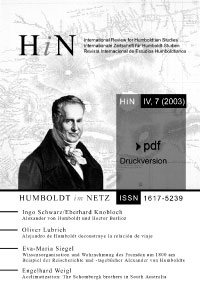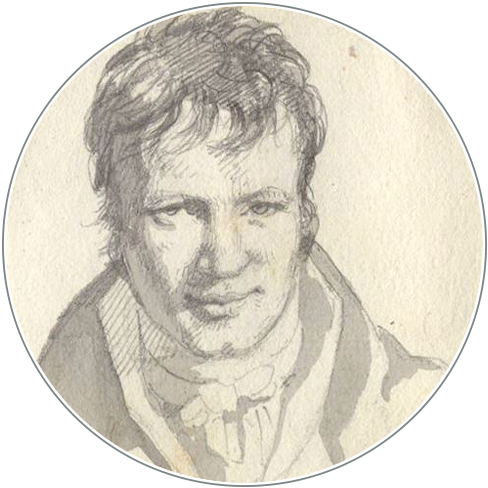Repräsentation und Augenschein. Organisation des Wissens und Wahrnehmung des Fremden um 1800 am Beispiel der Reiseberichte und -tagebücher Alexander von Humboldts
DOI:
https://doi.org/10.18443/42Keywords:
1800, Georg Foster, Moderne, Naturgemälde, Naturphilosophie, Reisetagebuch, Relation historiqueAbstract
Abstract
In modern times the instrumental reason is meant to be a condition for objectivity and rationality. Referring to this consideration the lecture turns to the question, in which way the instrumental reason impresses upon the encounter with the foreign around 1800 and on which organizational forms of knowledge it is based. How do the representations of European stores of knowledge shape that global reference framework, in which the travel reports and diaries of Alexander von Humboldt are today?
The thesis is, that his recordings about the conquest of the New World place the relation of the European world of senses to the supposed directness of the appearance and to the world of senses in the center. Furthermore a comparison to the writings of Georg Forster shows, in which way a change of representational forms at the turn of the 18th to the 19th century, which goes far beyond the genre of travel reports, was introduced.
Zusammenfassung
In der Moderne gilt die instrumentelle Vernunft als eine Bedingung für Objektivität und Rationalität. Der Vortrag wendet sich anhand dieser Überlegung der Frage zu, in welcher Weise sie die Begegnung mit dem Fremden um 1800 prägt und welche Organisationsformen von Wissen sie zur Voraussetzung hat. Wie gestalten die Repräsentationen europäischer Wissensbestände jenen globalen Bezugsrahmen aus, in dem die Reiseberichte und -tagebücher Alexander von Humboldts heute stehen? Seine Aufzeichnungen über die Eroberung der Neuen Welt, so die These, stellen das Verhältnis der europäischen Sinnwelt zur vermeintlichen Unmittelbarkeit des Augenscheins und zur Welt der Sinne in den Mittelpunkt. Durch einen Vergleich mit den Schriften Georg Forsters wird darüber hinaus deutlich, in welcher Weise an der Wende des 18. zum 19. Jahrhundert ein Wandel der Darstellungsformen eingeleitet worden ist, der über das Genre des Reiseberichts weit hinausweist.
Résumé
Dans le monde moderne, le raisonnement instrumental passe pour une condition d’objectivité et de rationalité. L’article a recours á la réflexion sur la question de savoir de quelle manière il marque la rencontre avec l’inconnu en 1800 et laquelle des formes d’organisation du savoir il a comme fondement. Comment se forment les représentations des stocks du savoir des Européens dans ce contexte global, dans lequel les rapports de voyage et les journaux intimes d’Alexander von Humboldt se trouvent-t-ils aujourd’hui?
Ses descriptions de la conquête du Nouveau Monde, comme thèse, montrent la relation entre le monde sensé des Européens avec la prétendue proximité des apparences et le monde des sens en moyenne. En comparaison à l’écrivain Georg Forster il apparaît clairement comment au tournant du 18eme au 19eme siècle un changement des formes de représentation s’est opéré au-delà du rapport de voyage d’Alexander von Humboldt.
Downloads
How to Cite
Issue
Section
License
Copyright (c) 2003 Eva-Maria Siegel

This work is licensed under a Creative Commons Attribution-NonCommercial 4.0 International License.
HiN operates under a Creative Commons-Licence (CC BY-NC 4.0), which permits the reproduction of articles, free of charge, for non-commercial use only and with the appropriate citation information. All authors publishing with HiN accept these terms of publication.
Authors retain the copyright for their articles and reviews. Copyright of the layout and design of HiN articles remains with the journal and cannot be used in other publications.










